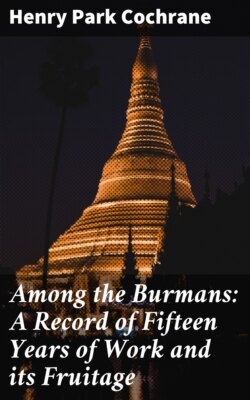Among the Burmans: A Record of Fifteen Years of Work and its Fruitage

Реклама. ООО «ЛитРес», ИНН: 7719571260.
Оглавление
Henry Park Cochrane. Among the Burmans: A Record of Fifteen Years of Work and its Fruitage
Among the Burmans: A Record of Fifteen Years of Work and its Fruitage
Table of Contents
Preface
I. FIRST EXPERIENCES
II. LIVING LIKE THE NATIVES
III. CUSTOMS OF THE BURMESE
IV. CHIEF RACES OF BURMA
THE BURMESE
THE SHANS
THE KARENS
THE KACHINS
THE CHINS
V. BUDDHISM AS IT IS
VI. BURMA'S OUTCASTS
VII. A NATION IN TRANSITION
VIII "BY ALL MEANS—SAVE SOME"
IX "WITH PERSECUTIONS"
X. HEROES AND HEROINES
XI. PECULIAR EXPERIENCES
XII. OBSTACLES
XIII. WHAT HATH GOD WROUGHT
Отрывок из книги
Henry Park Cochrane
Published by Good Press, 2019
.....
The climate soon begins to effect him so that he seems to lose the power to study. Inheriting a large organized work he is forced at once into service as a full-fledged missionary, before a pin-feather of experience has had time to start. Interruptions are frequent and unavoidable. How to find time for language study is indeed a serious problem—but he must find it, if his life is to tell for Christ, at its best. Moreover, the missionary must master practically two languages before he is fully equipped for service—the language of the book, and the language of the people. The formal style of classical Burmese would be as out of place in the jungle as the colloquial Burmese would be in the pulpit. In the one case it would not be understood, in the other it would give offense—for one may not "talk down" to even a native audience. Hence, to be effective the missionary must at the same time be faithful to study, and to real contact with the people. It is no easy matter, after one has struggled through all the years of training in the home-land, thumbing Latin, Greek, and Hebrew Lexicons until he fondly thinks that his training has been completed—to get right down again to the A B C of a new language. Here he meets something, that will test the soundness of his consecration and of his staying qualities. From first to last our great missionaries have been men who have thoroughly mastered the language of their people. But it is perfectly wonderful how the natives will listen respectfully to the most laborious attempts to speak to them in their own tongue. Not a smile at the most ridiculous mistakes, not a word or sign to indicate that they are not really understanding what you are driving at. This excessive respect sometimes leads to serious consequences. The missionary, thinking that he has made himself understood, is disappointed and hindered because things do not come to pass. The native is not wanting a sense of humour, and if he feels sure that you will enjoy the joke, he will point out the mistake, and join in the laugh over it.
Unlike other languages of Burma, the construction of a Burmese sentence is the reverse of the English order. Many sentences may be translated backward, word for word, certain connective particles becoming relative pronouns, with a perfect idiomatic English sentence as the result. The eye can soon be trained to take in a printed sentence as a whole, and grasp its meaning, without stopping to render it into English in the reversed order. But to keep this order in mind, in conversation, with the word expressing action left for the last, like the snapper to a whip, is not so easy. In acquiring the language by ear a difficulty arises from the universal habit of kun-chewing. Never careful about enunciating his words, a wad of kun in a Burman's cheek adds to the confusion of sounds. With mouth half full of saliva, chin protruding to keep it from slopping over—a mumbled jargon is what the ear must be trained to interpret as human speech.
.....